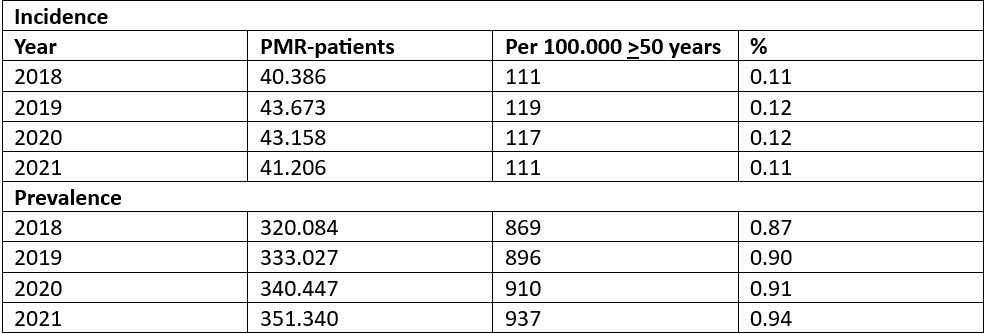Session Information
Date: Monday, November 18, 2024
Title: Vasculitis – Non-ANCA-Associated & Related Disorders Poster III
Session Type: Poster Session C
Session Time: 10:30AM-12:30PM
Background/Purpose: To date, there is limited data on the epidemiology of polymyalgia rheumatica (PMR) in Germany. National prevalence estimates suggest only 69,000 affected individuals, which would be low by international standards (source: https://dgrh.de/Start/DGRh/Presse/Daten-und-Fakten/Rheuma-in-Zahlen.html). This analysis presents up-to-date data representative of Germany.
Methods: A cross-sectional analysis was conducted on a sample of 4.8 million insured individuals, representative of the German population, from the InGef (Institute for Health Research Berlin GmbH) research database, containing anonymized longitudinal data from over 60 statutory health insurances. Inclusion criteria were age >50 years as of January 1st of each study year, continuous insurance status for a base period of 3 years and for the subsequent 8 quarters for longitudinal analysis. For incidence analyses, ICD codes M35.3 (PMR) and M31.5 (Giant Cell Arteritis with PMR) should not have been coded during the base period. Results were additionally extrapolated to the German population.
Results: Each year from 2018 to 2021, 1.7 million insured individuals met the inclusion and exclusion criteria. Table 1 shows incidence and prevalence for each study year. The mean age of incident patients was 71.8 (SD +9.7) years, and prevalent patients were 75.3 (SD +9.4) years old. 58.0% of incident and 62.7% of prevalent patients were female. Diagnosis was made predominantly in outpatient settings (88%), most commonly by general practitioners (61%), rheumatologists (10%), and orthopedists (8%). An additional 21% were referred to rheumatologists for treatment after diagnosis. General practitioners most frequently prescribed medication, followed by rheumatologists. Glucocorticoids were prescribed to 13% for <25 weeks, 43% for >25-52 weeks, 31% for >52-104 weeks, and 13% for >104 weeks. Methotrexate was prescribed to 19% of patients. Table 2 lists important comorbidities of prevalent patients, of which arterial hypertension and dyslipidemia are most common.
Conclusion: Contrary to previous beliefs, Germany has one of the highest incidences and prevalences of PMR. Diagnosis primarily occurs in general practice settings, with about one-third of patients being treated by rheumatologists. Comorbidities such as diabetes or cardiovascular diseases are common.
To cite this abstract in AMA style:
Schmidt W, Alibone M, Ludwig P, Obermüller D, Häckl D, Tönnessen K, Fließer M, Karl F, Nguyen H, Boas A, Venhoff N. Frequency, Diagnosis, and Management of Polymyalgia Rheumatica in Germany – Database Analysis of Medical Insurance Data [abstract]. Arthritis Rheumatol. 2024; 76 (suppl 9). https://acrabstracts.org/abstract/frequency-diagnosis-and-management-of-polymyalgia-rheumatica-in-germany-database-analysis-of-medical-insurance-data/. Accessed .« Back to ACR Convergence 2024
ACR Meeting Abstracts - https://acrabstracts.org/abstract/frequency-diagnosis-and-management-of-polymyalgia-rheumatica-in-germany-database-analysis-of-medical-insurance-data/


